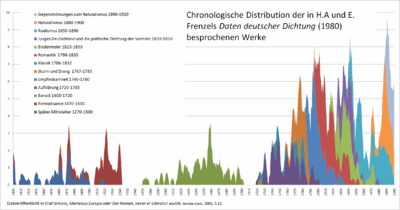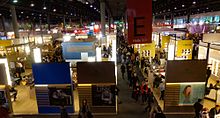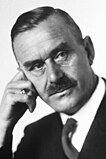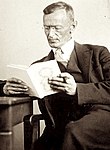German literature
This article includes a list of general references, but it lacks sufficient corresponding inline citations. (June 2022) |

German literature (
Medieval German literature is
Periodization

The Diagram was first published in Olaf Simons, Marteaus Europa, oder Der Roman, bevor er Literatur wurde (Amsterdam/ Atlanta: Rodopi, 2001), p. 12. It does not give a picture of the actual production of German literature, but the selection and classification of literary works by Herbert Alfred and Elizabeth Frenzel.[1]
- Medieval German literature
- Old High German literature (750–1050)
- Middle High German literature (1050–1350)
- Late medieval / Renaissance (1350–1500)
- Early Modern German literature (see Early Modern literature)
- Protestant Reformation(1500–1650)
- Baroque(1600–1720)
- Enlightenment(1680–1789)
- Modern German literature
- 18th- and 19th-century German literature
- Empfindsamkeit / Sensibility (1750s–1770s)
- Sturm und Drang / Storm and Stress (1760s–1780s)
- German Classicism (1729–1832)
- Weimar Classicism (1788–1805) or (1788–1832), depending on Schiller's (1805) or Goethe's (1832) death
- German Romanticism (1790s–1880s)
- Biedermeier (1815–1848)
- Young Germany (1830–1850)
- Poetic Realism (1848–1890)
- Naturalism (1880–1900)
- 20th-century German literature
- 1900–1933
- Fin de siècle (c. 1900)
- Symbolism
- Expressionism (1910–1920)
- Dada (1914–1924)
- New Objectivity (Neue Sachlichkeit)
- Well Known Writers of the 20th Century
- 1933–1945
- National Socialist literature
- Exile literature
- 1945–1989
- By country
- Federal Republic of Germany
- German Democratic Republic
- Austria
- Switzerland
- Other
- By thematic or group
- Post-war literature (1945–1967)
- Group 47
- Holocaust literature
- By country
- 1900–1933
- Contemporary German literature (1989–)
- 18th- and 19th-century German literature
Middle Ages
Medieval German literature refers to
Old High German
The Old High German period is reckoned to run until about the mid-11th century, though the boundary to Early Middle High German (second half of the 11th century) is not clear-cut.
The most famous work in OHG is the Hildebrandslied, a short piece of Germanic alliterative heroic verse which besides the Muspilli is the sole survivor of what must have been a vast oral tradition. Another important work, in the northern dialect of Old Saxon, is a life of Christ in the style of a heroic epic known as the Heliand.
Middle High German
The Middle High German period is conventionally taken to end in 1350, while the
Early Modern period
German Renaissance and Reformation
| Reformation-era literature |
|---|
- Sebastian Brant (1457–1521)
- Thomas Murner (1475–1537)
- Martin Luther (1483–1546)
- Philipp Melanchthon(1497–1560)
- Sebastian Franck (1500–1543)
- Johann Fischart (1545-1591)
Baroque period
The Baroque period (1600 to 1720) was one of the most fertile times in German literature. Many writers reflected the horrible experiences of the
18th century
The Enlightenment
|
|
Sensibility
Empfindsamkeit / Sensibility (1750s–1770s)
Sturm und Drang
Sturm und Drang (the conventional translation is "Storm and Stress"; a more literal translation, however, might be storm and urge, storm and longing, or storm and impulse) is the name of a movement in German literature and
19th century
German Classicism
Weimar Classicism (
Romanticism
- G.W.F. Hegel
- Jean Paul
- E.T.A. Hoffmann
- Friedrich Hölderlin
- Heinrich von Kleist
- Novalis (Friedrich von Hardenberg)
- Friedrich Schlegel
- August Wilhelm Schlegel
- Friedrich Schleiermacher
- Ludwig Tieck
- Friedrich de la Motte Fouqué
- Ludwig Uhland
- Arthur Schopenhauer
- Joseph von Eichendorff
Biedermeier and Vormärz
Realism and Naturalism
Poetic
Naturalism (1880–1900): Gerhart Hauptmann
20th century
1900 to 1933
- Fin de siècle (c. 1900)
- Weimar literature (1919–1933)
- Symbolism
- Expressionism (1910–1920)
- Dada (1914–1924)
- New Objectivity (Neue Sachlichkeit)
Well known writers of the 20th century
A well-known writer of
Nazi Germany
- National Socialist literature: see Nazi propaganda
Under the Nazi regime, some authors went into exile (Exilliteratur) and others submitted to censorship ("inner emigration", Innere Emigration)
- Inner Emigration: Gottfried Benn, Werner Bergengruen, Hans Blüher, Hans Heinrich Ehrler, Hans Fallada, Werner Finck, Gertrud Fussenegger, Ricarda Huch, Ernst Jünger, Erich Kästner, Volker Lachmann, Oskar Loerke, Erika Mitterer, Walter von Molo, Friedrich Reck-Malleczewen, Richard Riemerschmid, Reinhold Schneider, Frank Thiess, Carl von Ossietzky, Ernst Wiechert
- in exile: Ernst Bloch, Bertolt Brecht, Hermann Broch, Alfred Döblin, Lion Feuchtwanger, Bruno Frank, A. M. Frey, Anna Gmeyner, Oskar Maria Graf, Hermann Hesse, Heinrich Eduard Jacob, Hermann Kesten, Annette Kolb, Siegfried Kracauer, Emil Ludwig, Heinrich Mann, Klaus Mann, Thomas Mann, Balder Olden, Rudolf Olden, Robert Neumann, Erich Maria Remarque, Ludwig Renn, Alice Rühle-Gerstel, Otto Rühle, Alice Schwarz-Gardos, Anna Seghers, B. Traven, Bodo Uhse, Franz Werfel, Arnold Zweig, Stefan Zweig, Joseph Roth.
1945 to 1989
- Post-war literature of Holocaust literature (Paul Celan, Edgar Hilsenrath)
- Sarah Kirsch, Günter Kunert, Reiner Kunze, Heiner Müller, Ulrich Plenzdorf, Anna Seghers, Christa Wolf
- Postwar literature of Switzerland and Austria: Ingeborg Bachmann, Thomas Bernhard, Friedrich Dürrenmatt, Max Frisch, Elfriede Jelinek, Peter Handke
- Postmodern literature: Christian Kracht, Hans Wollschläger, Christoph Ransmayr, Marlene Streeruwitz, Rainald Goetz, Clemens J. Setz, Oswald Wiener
- W.G. Sebald
- Arno Schmidt
21st century

Much of contemporary poetry in the German language is published in literary magazines.
- Science-Fiction, Fantasy: Andreas Eschbach, Frank Schätzing, Wolfgang Hohlbein, Bernhard Hennen, Walter Moers
- Pop Literature: Benjamin von Stuckrad-Barre
- Feridun Zaimoglu, Rafik Schami[8]
- Poetry: Jürgen Becker, Marcel Beyer, Theo Breuer, Rolf Dieter Brinkmann, Marc Engelhard, Hans Magnus Enzensberger, Aldona Gustas, Ernst Jandl, Thomas Kling, Uwe Kolbe, Friederike Mayröcker, Durs Grünbein, Kurt Marti, Karl Krolow, Elke Erb, Ulrike Draesner, Ann Cotten, Monika Rinck
- Aphorists: Hans Kruppa
- Thriller: Ingrid Noll
- Novel: Wilhelm Genazino, Günter Grass, Herta Müller, Siegfried Lenz, Charlotte Link, Rainald Goetz, Anna Kaleri, Norbert Scheuer, Dietmar Dath, Christian Kracht, Kathrin Schmidt, Burkhard Spinnen, Robert Menasse, Martin Walser, Andreas Mand,[9] Zsuzsa Bánk, Marc Degens, Jenny Erpenbeck, Klaus Modick, Peter Handke, Elfriede Jelinek, Daniel Kehlmann
- Literaturport (in German): audio clips of contemporary literature, many read out by the authors themselves
- German-American literature: Paul-Henri Campbell, Walter Abish
Nobel Prize laureates
The Nobel Prize in Literature has been awarded to German-language authors fourteen times (as of 2020), tying with French-language authors, or the second most often after English-language authors (with 32).
The following writers are from Germany unless stated otherwise:
| Thomas Mann (1875–1955) |
Hermann Hesse (1877–1962) |
|---|---|
 |

|
- 1902 Theodor Mommsen
- 1908 Rudolf Christoph Eucken
- 1910 Paul Heyse
- 1912 Gerhart Hauptmann
- 1919 Carl Spitteler (Swiss)
- 1929 Thomas Mann
- 1946 Hermann Hesse
- 1966 Nelly Sachs
- 1972 Heinrich Böll
- 1981 Elias Canetti (Bulgarian, later British)
- 1999 Günter Grass
- 2004 Elfriede Jelinek (Austrian)
- 2009 Herta Müller (Romanian by birth, later naturalized in West Germany)
- 2019 Peter Handke (Austrian)
See also
- Goethe-Institut
- German-speaking Europe
- Swiss literature
- Austrian literature
- Stiftung Lesen
- History of German
- List of German-language authors
- List of German-language playwrights
- List of German-language poets
- List of German-language philosophers
- History of literature
- Sophie (digital lib)
- Luso-Germanic Literature
- Kindler literature encyclopedia
- Media of Germany
- Geographical distribution of German speakers
References
- Nazi era has been criticized as "grotesque" or as exhibiting "bizarre gaps" (viz. omitting Jewish authors); see Volker Weidermann, Ein grotesker Kanon, Frankfurter Allgemeine Zeitung, 11 May 2009. Daten deutscher Dichtung was reprinted in 35 editions, but was discontinued in 2009.
- OCLC 22567416.
- ISBN 978-1-57113-510-0.
- ISBN 978-0-521-65628-3.
- ^ "Le Monde's 100 Books of the Century by Le Monde - The Greatest Books". thegreatestbooks.org. Retrieved 23 August 2021.
- ^ "Why Kafka Still Matters | Psychology Today". www.psychologytoday.com. Retrieved 23 August 2021.
- ^ "Franz Kafka Biography". Encyclopedia Britannica.
- ^ Cuadra, P. V. (2010). "Las traducciones al español de literatura intercultural alemana". Revista de Filología Alemana: 301–309.
- ^ Twenty-Third Annual Bibliography, Archived 15 April 2012 at the Wayback Machine Max Kade Center for Contemporary German Literature at the Washington University, in St. Louis, Missouri, Retrieved 13 December 2011
Literature
English
- Cambridge History of German Literature. Watanabe-O’Kelly, Helen, ed. Cambridge and New York: Cambridge University Press, 1997.
- Konzett, Matthias Piccolruaz. Encyclopedia of German Literature. Routledge, 2000.
- The Oxford Companion to German Literature, ed. by Mary Garland and Henry Garland, 3rd edition, Oxford University Press, 1997
- Grange, William, ed. Historical dictionary of German literature to 1945 (2011) online
- Van Cleve, John W. (1986). The Merchant in German Literature of the Enlightenment. Chapel Hill.
- Van Cleve, John W. (1991). The Problem of Wealth in the Literature of Luther's Germany. Camden House.
- Ed.: Alexandra Merley Hill, Hester Baer. German Women's Writing in the Twenty-first Century. United Kingdom, Camden House, 2015.
German
- Bernd Lutz, Benedikt Jeßing (eds.): Metzler Lexikon Autoren: Deutschsprachige Dichter und Schriftsteller vom Mittelalter bis zur Gegenwart, Stuttgart und Weimar: 4., aktualisierte und erweiterte Auflage 2010
- ISBN 3-87512-186-4
- Theo Breuer, Kiesel & Kastanie (ed.): Von neuen Gedichten und Geschichten, Sistig/Eifel : Edition YE, 2008, ISBN 3-87512-347-6
- Jürgen Brocan, Jan Kuhlbrodt (eds.), Umkreisungen. 25 Auskünfte zum Gedicht, Leipzig: Poetenladen Literaturverlag, 2010
- Manfred Enzensperger (ed.), Die Hölderlin-Ameisen: Vom Finden und Erfinden der Poesie, Cologne: Dumont, 2005
- Peter von Matt, Die verdächtige Pracht. Über Dichter und Gedichte, Munich [etc.] : Hanser, 1998
- Joachim Sartorius (ed.), Mimima Poetica. Für eine Poetik des zeitgenössischen Gedichts, Cologne : Kiepenheuer & Witsch, 1999
Anthologies
- German poetry from 1750 to 1900, ed. by Robert M. Browning. Foreword by ISBN 0-8264-0283-6
- Twentieth-Century German Poetry: An Anthology, edited by Michael Hofmann, New York: Farrar, Straus, and Giroux, 2008 (Paperback Edition), 544 pp., ISBN 0-374-53093-9
- Heinz Ludwig Arnold (ed.), TEXT+KRITIK: Lyrik des 20. Jahrhunderts (1999).
- Verena Auffermann, Hubert Winkels (ed.), Beste Deutsche Erzähler (2000–)
- Hans Bender (ed.), In diesem Lande leben wir. Deutsche Gedichte der Gegenwart (1978)
- Hans Bender, Was sind das für Zeiten. Deutschsprachige Gedichte der achtziger Jahre (1988)
- Christoph Buchwald, Uljana Wolf (ed.), Jahrbuch der Lyrik 2009 (2009)
- Karl Otto Conrady (ed.), Der Große Conrady. Das Buch deutscher Gedichte. Von den Anfängen bis zur Gegenwart (2008).
- Hugo von Hofmannsthal (ed.), Deutsche Erzähler I (1912, 1979)
- Marie Luise Kaschnitz (ed.), Deutsche Erzähler II (1971, 1979)
- Boris Kerenski & Sergiu Stefanescu, Kaltland Beat. Neue deutsche Szene (1999)
- Axel Kutsch (ed.), Versnetze. Deutschsprachige Lyrik der Gegenwart (2009)
- Andreas Neumeister, Marcel Hartges (ed.), Poetry! Slam! Texte der Pop-Fraktion (1996)
External links
- Robertson, John George (1911). . Encyclopædia Britannica. Vol. 11 (11th ed.). pp. 783–800.
- Sophie – A digital library of works by German-speaking women
- . The American Cyclopædia. 1879.
